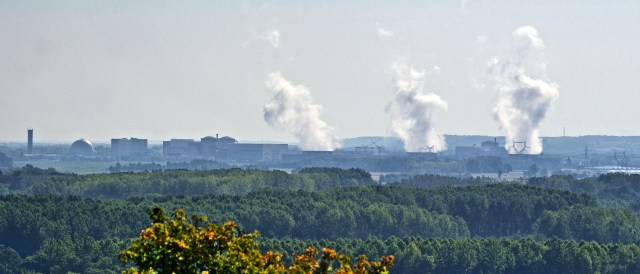The French government has recently presented the first details on a long expected energy transition law. While it might help in the transport and heating sector, too little is done to switch France’s energy system from nuclear to renewables, argues Kathrin Glastra.

The closer you look at it, the less green it becomes – French nuclear power and energy policy. (Photo by Daniel Jolivet, CC BY 2.0)
By Kathrin Glastra, hbs EU Office, Brussels
If you had hoped that good things will come to those who wait, the upcoming proposal for the French framework energy law (the national law on energy transition) might disappoint you: after several postponements, French Ecology Minister Ségolène Royal finally announced the outline of the future law to her colleagues last month. This (yet to be published) law proposal is the next step in the government-run “national debate on energy transition”, which was launched in January 2012. It aims at developing a proposal for a national energy transition law in consultation with a large number of French stakeholders.
The future law proposal will contain over 60 concrete measures to put the energy transition in place in France, but critics say it does not offer a convincing vision for a future-oriented energy policy.
The biggest news is certainly that there is no fixed end date for nuclear power, not even concerning the contended Fessenheim plant which is located less than a mile from the German border. This had been debated intensely beforehand, with a proposed life span of no more than 40 years. The current proposal contains only a fixation of a capacity at 63.2 GW. Very disappointing, but some say that in order to build a new reactor (EPR), two old ones would have to be shut down – this could indeed happen with this proposal. But this underlines the need for a stronger political direction over EDF (Électricité de France), the national electric utility company. Yet their responsibilities under the new law have been left unclear.
The remaining question is how French President Hollande will achieve his election campaign promise to reduce the share of nuclear in electricity production from 75% down to 50% by 2025.
Furthermore, the national target for renewable energies lacks ambition: the proposal contains only a very modest 32% renewables target by 2030 (compared with 14% in 2012).
On a more positive note, the financial means for the French energy transition are now allocated in new “national fund for the energy transition and green growth”, which releases up to 1,5 billion EUR (about 2 billion USD) over the next three years. This allows for more renewables funding through the French Agency for the Environment and Energy (ADEME), including the development of new approaches for heating from renewable sources such as wood, biomass, waste etc. This could break the cycle of wide-spread electric heating in France.
Another priority of the law is to increase the energy efficiency in buildings and transport by facilitated renovation credits (so-called ‘éco-crédits’ at 0%) and other fiscal incentives in 2014 and 2015 for the retrofitting of public and private buildings. The planned promotion and roll-out of electric cars and charging stations all over France is surely a step in the right direction, yet much more could be done by improving and greening the public transportation sector.
All of these measures could contribute to one of the overall goals of the law to cut energy consumption in half by 2050. Once the official proposal is out, it will be debated in the French Parliament in autumn 2014 – the law will not enter into force before 2015. While still waiting for the concrete law proposal, this first outline seems quite uninspired for now, lacking the much-needed ambition to turn around the French economy towards a sustainable energy generation and distribution in France and in Europe.
Kathrin Glastra is a program coordinator in the Brussels office of the Heinrich Boell Foundation. She is responsible for the foundation’s project Energytransition@EU which focuses on creating an inclusive European energy transition debate.
Please note that you can find the key findings and a full translation of our book “German Energy Transition” in French here.